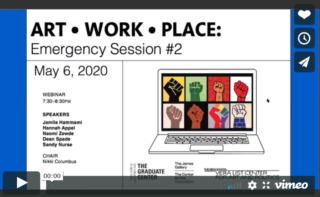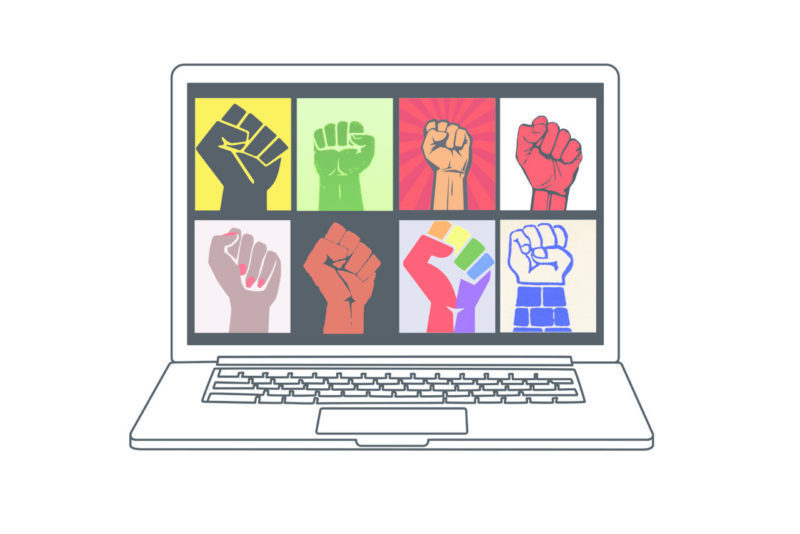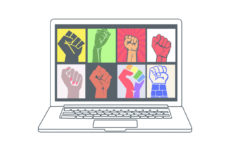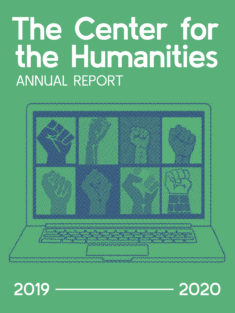About this online emergency forum
Thank you for joining us on Wednesday May 6th, for "ART • WORK • PLACE: Emergency Session II." Hundreds of you came together from across the US and around the world to exchange much-needed knowledge, resources, and uplifting support. Your contributions to these discussions of cross-organizing and local mutual aid efforts were practical, hopeful and invigorating! Our voices are truly strong forces for combatting the disproportionate burdens of healthcare costs and debt, lack of living wage for student workers and university adjuncts, and for calling on much more from government and financial structures.
This was the second of a series of sessions that will continue in June and the coming months. We'd love to hear from you as we plan and organize next steps.Please provide us with feedback on the second emergency session and suggestions for issues or speakers you'd like to hear from next, even if you couldn't join us on Wednesday.
The video documentation is available here.

List of Resources shared by participants.
As online education enters its third month, this second emergency session shifts attention from the museum to the university. Students are demanding tuition refunds while administrators are raising fees and slashing budgets, and CUNY is gutted at both the state and city levels. How can students and adjuncts fight for equity in the face of escalating austerity?
Nationwide, student debt has reached $1.6 trillion—a total we’re told is too big to forgive, yet Congress and the Federal Reserve have just given away trillions to corporations, cruise lines, and hotel chains. Student loans are only one category of household debt, alongside medical, housing, and criminal justice debt. Although the vast majority of Americans are burdened by debt, it is disproportionately held by Black women. How can we mobilize millions of debtors into collective action?
Mutual aid increasingly fills in for the social safety net destroyed by neoliberalism. As COVID-19 continues to lay bare the grotesque injustices of the current system, community support has risen dramatically. But how long can neighbors and colleagues sustain each other in a vacuum of leadership and resources? How do we enlist legislators and make use of the tools of government to further our aims?
The first hour of the online forum will feature five speakers on these issues; in the second hour, they will be joined by additional participants for breakout Q&A sessions.
Speakers include:
Hannah Appel (UCLA, Debt Collective) will explain the concept of debtors’ unions and the use of collective power to influence policy.
David Xu Borgonjon (Columbia, RISD, XCampus) will talk about organizing across universities to assist international students.
Sami Disu (CUNY John Jay) will outline the demands of the Free CUNY campaign.
Jamila Hammami (CUNY Adjunct Project) will discuss the challenges facing CUNY students and adjuncts, and strategies for dealing with the coming austerity budgets.
Nicholas Mirzoeff (NYU) will speculate on the future of the university at a time of remote learning and reduced resources.
Yuh-Line Niou (NYS Assembly) will speak about what actions New York State should take.
Sandy Nurse (Mayday Space) will describe the importance of community networks in mutual aid.
Dean Spade (Seattle University Law, Big Door Brigade) will offer a primer on mutual aid and what it can achieve.
Naomi Zewde (CUNY School of Public Health & Health Policy) will address the racialization of debt and illness.
The session will be chaired by Nikki Columbus.
The organizers have budgeted direct aid to groups and individuals in need as part of this event. For more information, please click here.
Please submit questions for discussion in the breakout sessions here.
A description and video documentation of the first Emergency Session (and a list of shared resources) can be found here.
Organized by Nikki Columbus and Michelle Millar Fisher, in collaboration with the PhD Program in Art History (The Graduate Center, CUNY), The James Gallery/Center for the Humanities (The Graduate Center, CUNY) and the Vera List Center for Art and Politics (The New School), where it is sponsored in part by the Helen Shapiro Lectureship.





